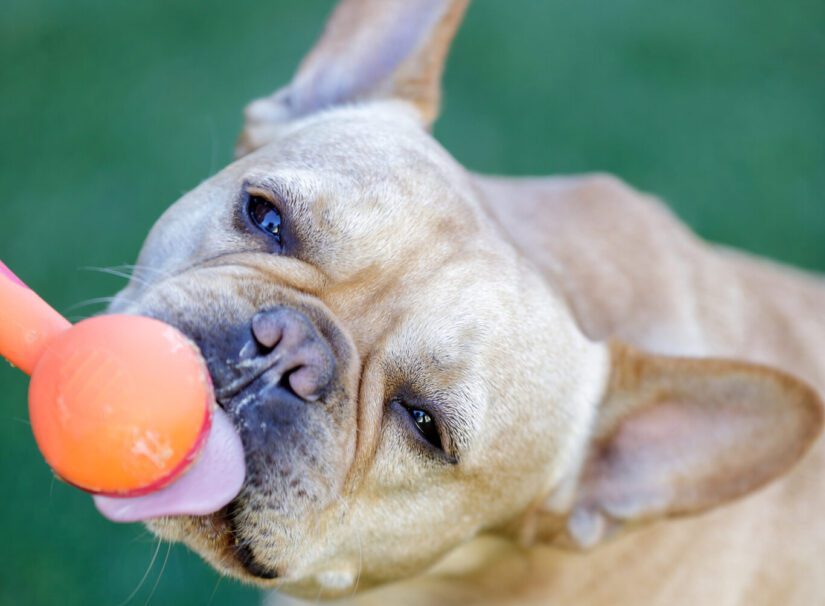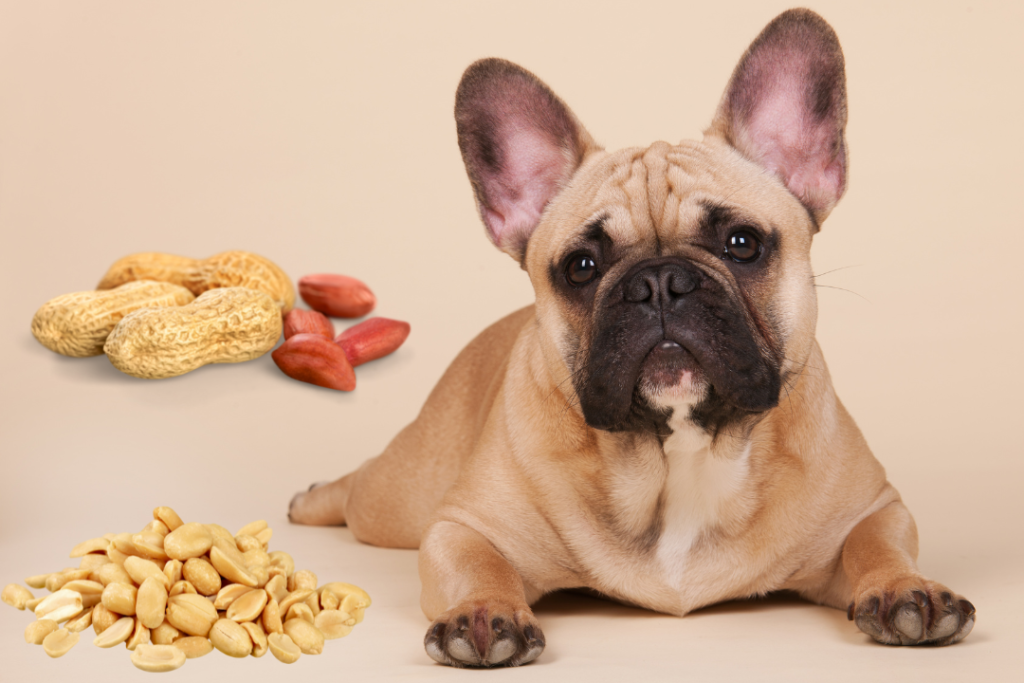When it comes to the health of our beloved furry friends, it’s important to be aware of the foods that can be harmful to them. One food that may come as a surprise is peanuts. While peanuts are a popular snack for humans, it’s important to consider the potential dangers they pose to French Bulldogs.
French Bulldogs are prone to allergies and sensitivities, and peanuts can be a common allergen in dogs. Peanuts contain a protein called aflatoxin, which can be toxic to dogs in high amounts. In addition, peanuts are also highly fatty, which can lead to obesity and other health issues in French Bulldogs. It’s best to avoid feeding peanuts to your French Bulldog to ensure their overall well-being.
Peanuts can be harmful to French Bulldogs as they pose a choking hazard and can lead to pancreatitis due to their high fat content. Additionally, peanuts may contain aflatoxins, which are toxic substances that can be harmful to dogs. It’s best to avoid feeding peanuts to French Bulldogs and opt for dog-friendly alternatives for their overall health and well-being.

The Truth About Peanuts and French Bulldogs
French Bulldogs are adorable and popular pets known for their playful and friendly nature. As a responsible pet owner, it’s natural to wonder about the impact of various foods on your furry friend’s health. Peanuts are a common snack, but are they safe for French Bulldogs to consume? In this article, we’ll explore the potential risks and benefits of feeding peanuts to French Bulldogs, helping you make an informed decision about their diet.
The Nutritional Profile of Peanuts
Peanuts are a legume that is rich in nutrients, including protein, healthy fats, vitamins, and minerals. They contain important nutrients like niacin, vitamin E, magnesium, and phosphorus that are beneficial for human health. However, do these nutritional benefits extend to French Bulldogs as well?
It’s important to note that while peanuts contain beneficial nutrients, they also have some potential downsides when it comes to French Bulldogs. Let’s dive deeper into the possible risks and benefits of peanuts for French Bulldogs.
The Risks of Feeding Peanuts to French Bulldogs
1. Allergic Reactions
One of the main concerns with feeding peanuts to French Bulldogs is the risk of allergic reactions. Just like humans, some dogs may be allergic to peanuts or develop an allergy over time. Allergies can lead to various symptoms, including itching, skin rashes, gastrointestinal upset, and even difficulty breathing.
2. Choking Hazard
Another risk of feeding peanuts to French Bulldogs is the potential for choking. Peanuts are small, and if not properly chewed, they can get lodged in the dog’s throat, leading to choking. French Bulldogs have a brachycephalic skull structure, which means they have a short snout and respiratory system, making them more prone to choking incidents.
3. Weight Gain
Peanuts are calorie-dense and high in fat. Feeding large amounts of peanuts to French Bulldogs can contribute to weight gain, which can lead to various health issues such as joint problems, heart disease, and reduced overall mobility. French Bulldogs are prone to obesity, so it’s crucial to monitor their calorie intake and maintain a healthy weight.
The Benefits of Feeding Peanuts to French Bulldogs (In Moderation)
While there are risks associated with feeding peanuts to French Bulldogs, there can also be some benefits when done in moderation and under the guidance of a veterinarian.
1. Protein Source
Peanuts are a good source of plant-based protein, which can complement the protein intake from their regular dog food. Protein is essential for muscle growth, repair, and overall development. However, it’s crucial to ensure that the overall protein intake is appropriate for your French Bulldog’s specific dietary needs, as excessive protein can also be harmful.
2. Healthy Fats
Peanuts contain healthy fats, such as monounsaturated and polyunsaturated fats, which can contribute to the dog’s overall well-being. These fats are important for energy, healthy skin and coat, and the absorption of fat-soluble vitamins. However, it’s essential to monitor the fat intake and ensure it doesn’t exceed the recommended levels for your French Bulldog’s breed and activity level.
Alternatives to Peanuts for French Bulldogs
If you are concerned about the potential risks of feeding peanuts to your French Bulldog, there are several alternative treats and snacks you can consider:
- Carrots: Carrots are a low-calorie and nutritious option that can be given as a crunchy snack.
- Blueberries: Blueberries are packed with antioxidants and are safe for dogs to enjoy in moderation.
- Green Beans: Green beans are a low-calorie and fiber-rich option that can be used as a healthy treat.
- Lean Meats: Cooked lean meats like chicken or turkey can be given as occasional treats, as long as they are boneless and free from seasoning.
- Dog-Specific Treats: There are many commercially available treats formulated specifically for canine consumption. Look for treats that are made with high-quality ingredients and designed for your dog’s breed and size.
Consulting with a Veterinarian
Before introducing any new food into your French Bulldog’s diet, it’s always best to consult with a veterinarian. They can provide personalized advice based on your dog’s health, age, weight, and specific dietary needs. Additionally, if your French Bulldog shows any signs of an allergic reaction or discomfort after consuming peanuts or any other food, seek immediate veterinary attention.
Summary
While peanuts can have potential benefits for French Bulldogs, they also come with risks such as allergies, choking hazards, and weight gain. It’s important to assess your French Bulldog’s individual needs, consult with a veterinarian, and provide a balanced and appropriate diet tailored to their specific requirements. Remember, moderation is key, and always prioritize your dog’s health and well-being.
Key Takeaways: Are Peanuts Bad for French Bulldogs?
- Peanuts can be harmful to French Bulldogs due to their small size and potential choking hazards.
- Peanuts are high in fat and can lead to weight gain and digestive issues in French Bulldogs.
- Peanuts contain a protein called aflatoxin, which can be toxic to dogs if consumed in large amounts.
- Peanut allergies are common in dogs, and French Bulldogs may be more prone to developing allergies.
- If you want to give your French Bulldog a nutty treat, opt for dog-safe alternatives like unsalted and unsweetened peanut butter in moderation.
Frequently Asked Questions
Here are some common questions about whether peanuts are bad for French Bulldogs:
1. Can French Bulldogs eat peanuts?
Yes, French Bulldogs can safely eat peanuts in moderation. Peanuts are not toxic to dogs, including French Bulldogs. However, it’s important to note that peanuts should be fed in moderation and with caution.
While plain, unsalted peanuts can provide some nutritional benefits for dogs, they are also high in fat. Feeding your French Bulldog too many peanuts can lead to weight gain and contribute to obesity, which is a common problem in this breed. Additionally, some dogs may have allergies or sensitivities to peanuts, so it’s important to monitor your dog for any adverse reactions.
2. What are the potential risks of feeding peanuts to French Bulldogs?
Feeding peanuts to French Bulldogs can pose a few risks if not done in moderation. The high-fat content in peanuts can contribute to obesity, which can lead to various health issues, such as joint problems, heart disease, and diabetes. Additionally, some dogs may have allergies or sensitivities to peanuts, which can cause digestive upset, skin issues, or even anaphylactic reactions in severe cases.
If you choose to feed your French Bulldog peanuts, make sure they are unsalted and do not contain any added seasonings or flavorings, as these can be harmful to your dog’s health. It’s best to consult with your veterinarian before introducing peanuts or any new food into your French Bulldog’s diet.
3. How should peanuts be introduced to a French Bulldog’s diet?
When introducing peanuts to your French Bulldog’s diet, it’s important to start with small quantities and observe their reaction. Begin by offering a small piece of plain, unsalted peanut as a treat and monitor for any signs of adverse reactions such as vomiting, diarrhea, or itching.
If your French Bulldog tolerates the peanut well, you can gradually increase the amount over time. However, always keep the portion size small and avoid feeding peanuts too frequently. Remember, peanuts should be given as an occasional treat and not as a staple food in your dog’s diet.
4. Are there any alternatives to peanuts for French Bulldogs?
Avoiding peanuts altogether is a safe option if you’re concerned about the potential risks or your French Bulldog has shown signs of allergies or sensitivities. There are several alternative treats and snacks that you can offer your French Bulldog instead of peanuts.
Some suitable alternatives include small pieces of cooked chicken, lean beef, carrots, green beans, or plain, unsalted rice crackers. These options can provide your French Bulldog with a satisfying treat without the risks associated with peanuts.
5. When should I consult a veterinarian regarding peanuts and my French Bulldog?
If you have any concerns or questions about feeding peanuts to your French Bulldog, it’s always best to consult with a veterinarian. They can provide personalized advice based on your dog’s specific needs and health status.
A veterinarian can also help determine if your French Bulldog has any allergies or sensitivities that may be triggered by peanuts, and recommend alternative treat options if necessary. It’s important to prioritize your French Bulldog’s health and well-being by seeking professional guidance when needed.

In summary, peanuts can be harmful to French Bulldogs.
French Bulldogs have a higher risk of developing allergies and digestive issues, and peanuts can exacerbate these conditions. Peanuts are also a choking hazard due to their small size. It’s best to keep peanuts and peanut products away from French Bulldogs to ensure their health and safety.
